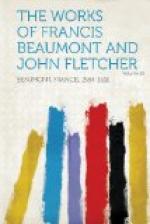He scatters Wit, and Sence so freely flings That
very Citizens speake handsome things, Teaching
their Wives such unaffected grace, Their
Looks are now as handsome as their Face. Nor
is this violent, he steals upon The yeilding Soule
untill the Phrensie’s gone; His
very Launcings do the Patient please, As
when good Musicke cures a Mad Disease.
Small Poets rifle Him, yet thinke it faire, Because
they rob a man that well can spare; They feed upon
him, owe him every bit, Th’are all but
Sub-excisemen of his Wit.
J. M.
On the Workes of Beaumont and Fletcher, now at length printed.
Great paire of Authors, whom one equall Starre Begot so like in Genius, that you are In Fame, as well as Writings, both so knit, That no man knowes where to divide your wit, Much lesse your praise; you, who had equall fire, And did each other mutually inspire; Whether one did contrive, the other write, Or one framed the plot, the other did indite; Whether one found the matter, th’other dresse, Or the one disposed what th’other did expresse; Where e’re your parts betweene your selves lay, we, In all things which you did but one thred see, So evenly drawne out, so gently spunne, That Art with Nature nere did smoother run. Where shall I fixe my praise then? or what part Of all your numerous Labours hath desert More to be fam’d then other? shall I say, I’ve met a lover so drawne in your Play, So passionately written, so inflamed, So jealously inraged, then gently tam’d, That I in reading have the Person seene. And your Pen hath part Stage and Actor been? Or shall I say, that I can scarce forbeare To clap, when I a Captain do meet there, So lively in his owne vaine humour drest, So braggingly, and like himself exprest, That moderne Cowards, when they saw him plaid, Saw, blusht, departed guilty, and betraid? You wrote all parts right; whatsoe’re the Stage Had from you, was seene there as in the age, And had their equall life: Vices which were Manners abroad, did grow corrected there: They who possest a Box, and halfe Crowns spent To learne Obscenenes, returned innocent, And thankt you for this coznage, whose chaste Scene Taught Loves so noble, so reformed, so cleane, That they who brought foule fires, and thither came To bargaine, went thence with a holy flame. Be’t to your praise too, that your Stock and Veyne Held both to Tragick and to Comick straine; Where e’re you listed to be high and grave, No Buskin shew’d more solem[n]e, no quill gave Such feeling objects to draw teares from eyes, Spectators sate part in your Tragedies. And where you listed to be low, and free, Mirth turn’d the whole house into Comedy; So piercing (where you pleas’d) hitting a fault, That humours from your pen issued all salt. Nor were you thus in Works and Poems knit, As to be but two halfes, and make one wit; But as some things we see, have double cause, And




